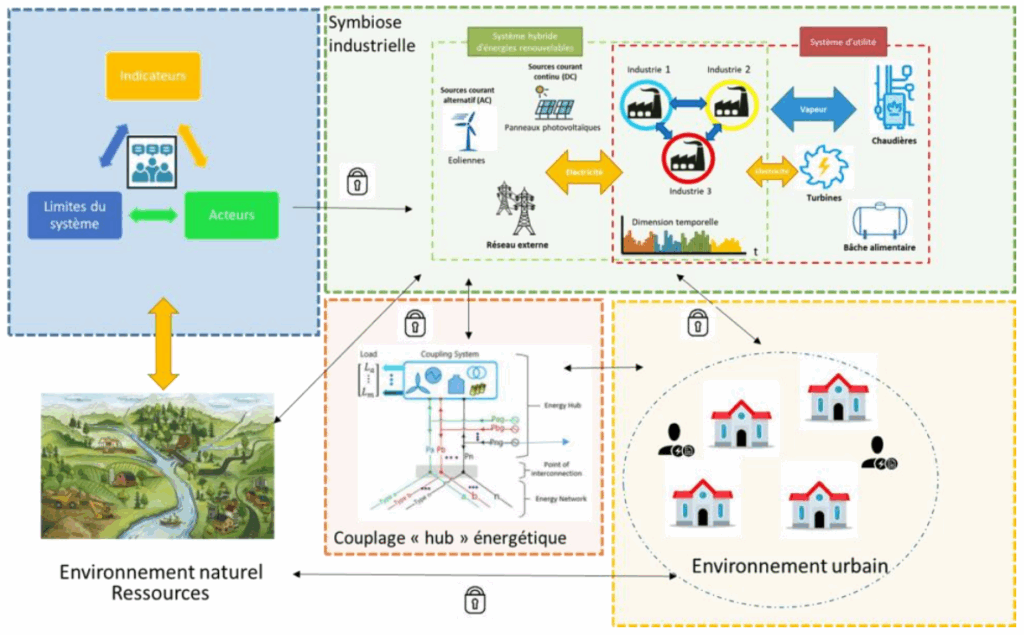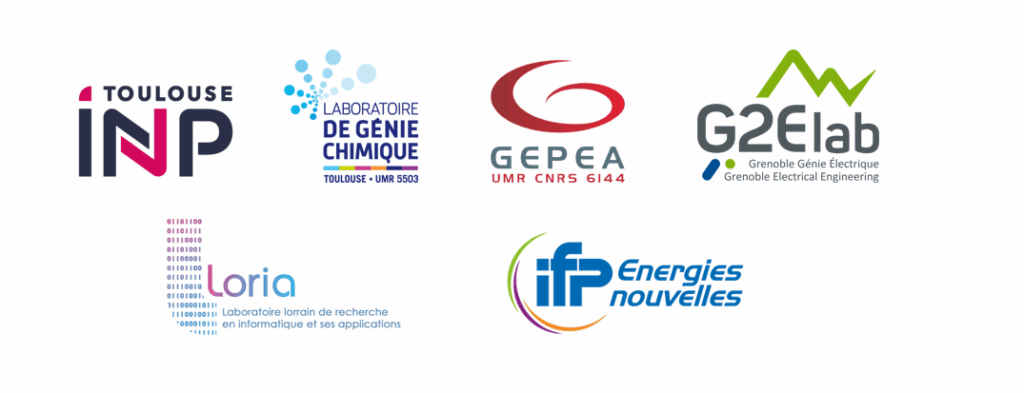
ACT-4-IE Project
A systemic and territorial approach to decarbonising business parks through industrial ecology

Project coordinated by Toulouse INP
Duration of 6 years
1,44 millions euros of budget
2 theses and 1 internship
Context and challenges
The ACT-4-IE project proposes to implement a systemic approach to assess, diagnose and optimise industrial areas in order to transform them into agile, low-carbon territories, whereas they are generally managed without taking into account the urban and industrial environment that surrounds them. This project aims to develop methods and tools to promote integrated and circular flow management at the territorial level, in order to fuel local interactions. This must include the diversity of stakeholders, their diverse perspectives and objectives (cost, environmental impact) with a focus on CO₂ emissions and sustainability.
Various categories of flows (materials, waste, energy, data and information) and services must be intertwined at different scales, both within eco-industrial parks and with links to external water/resource/energy networks. Performance indicators need to be clearly defined to assess the impact of optimal solutions to assist decision-makers at the territorial level. In light of cyber-physical systems, resource exchange networks must be adaptable, secure, and integrated into an environmental dynamic.
The methodology must consider multi-level aspects (levels of detail, data management) and the variety of temporal dynamics in subsystems, as well as the computing time required. The scientific challenges of the proposal are based primarily on combining modelling formalism and optimisation methods adapted to multiple levels, actors and criteria in order to drive industrial transformation.
Scientific objectives
The ACT-4-IE project proposes to implement a systemic approach to assess, diagnose and optimise industrial areas in order to transform them into agile, low-carbon territories, whereas they are generally managed without taking into account the urban and industrial environment that surrounds them. This project aims to develop methods and tools to promote integrated and circular flow management at the territorial level, in order to fuel local interactions. This must include the diversity of stakeholders, their diverse perspectives and objectives (cost, environmental impact), with a focus on CO₂ emissions and sustainability.
Industrial and territorial ecology (ITE) as a driver of transformation towards decarbonisation and sustainability in industry. The implementation of ITE in eco-industrial parks (EIP) is often limited to dedicated hubs, industrial zones or maritime areas. However, other inland areas could help to promote circular management of flows and services within eco-industrial parks, as well as integration with external nodes and networks of resources, water and energy.
Benchmark: identification of several digital platforms, development of traditional optimisation tools to optimise energy flows in industries.
Next, go further using multi-scale, multi-stakeholder, multi-criteria strategies to model, optimise and implement decision support for stakeholders in order to overcome potential conflicts of objectives, reconcile temporal and spatial scales, balance centralised and decentralised management, take into account data flexibility and uncertainties at the design stage, and deal with multi-career and multi-location energy systems and other resource networks.
Diagnostic and evaluation framework: establishment of systems and networks – performance model analysis – 4IE methodology
Expected results: definition of Key Performance Indicators (KPIs) to assess the transformation of an industrial site: diagnosis and evaluation phase of territorial integration (TRL 4), mathematical formulation and problematisation based on the definition of a superstructure compatible with different optimisation methods; performance analysis of the methods developed in the project based on case studies, multi-criteria, multi-stakeholder and multi-objective methodology and support tools, or evaluating, optimising and monitoring territorial synergies.
Develop a methodology for transforming industries to reduce CO₂ emissions to a minimum.
The consortium

Project publications
Boix, M., de Lavaissiere, H., Negny, S., 2024. https://doi.org/10.1016/B978-0-443-28824-1.50575-5 de Lavaissiere, H., Boix, M., Negny, S., 2023. IIECON 2023, Paris. Poster
Boix, M., de Lavaissiere, H., Negny, S., 2024. ESCAPE 34, Florence. Poster
Thomas, S., Boix, M. Negny, S., 2024. CIEC 1, Montpellier. Oral
Thomas, S., Boix, M., Negny S., Keynote, SFGP 2024,Deauville, 2024
More projects


